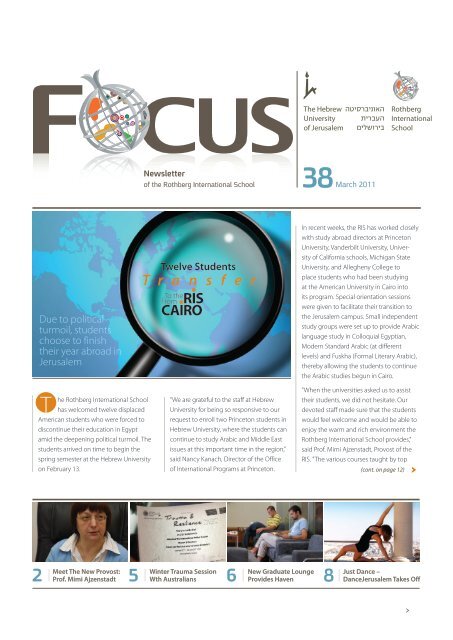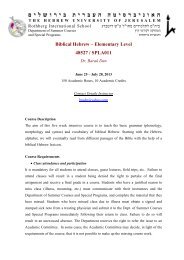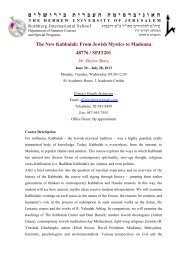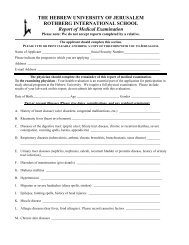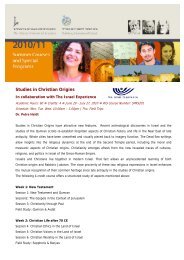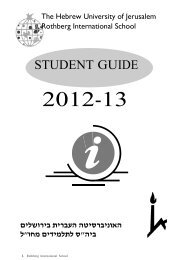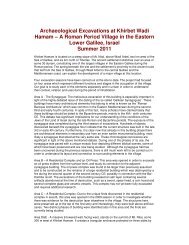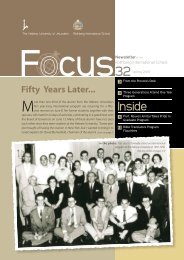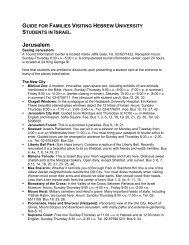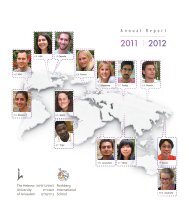prof. mimi ajzenstadt - Rothberg International School
prof. mimi ajzenstadt - Rothberg International School
prof. mimi ajzenstadt - Rothberg International School
You also want an ePaper? Increase the reach of your titles
YUMPU automatically turns print PDFs into web optimized ePapers that Google loves.
The Hebrew<br />
University<br />
of Jerusalem<br />
האוניברסיטה<br />
העברית<br />
בירושלים<br />
<strong>Rothberg</strong><br />
<strong>International</strong><br />
<strong>School</strong><br />
Newsletter<br />
of the <strong>Rothberg</strong> <strong>International</strong> <strong>School</strong><br />
38<br />
March 2011<br />
Due to political<br />
turmoil, students<br />
choose to finish<br />
their year abroad in<br />
Jerusalem<br />
Twelve Students<br />
T r a n s f e r<br />
To the<br />
From RIS<br />
CAIRO<br />
In recent weeks, the RIS has worked closely<br />
with study abroad directors at Princeton<br />
University, Vanderbilt University, University<br />
of California schools, Michigan State<br />
University, and Allegheny College to<br />
place students who had been studying<br />
at the American University in Cairo into<br />
its program. Special orientation sessions<br />
were given to facilitate their transition to<br />
the Jerusalem campus. Small independent<br />
study groups were set up to provide Arabic<br />
language study in Colloquial Egyptian,<br />
Modern Standard Arabic (at different<br />
levels) and Fuskha (Formal Literary Arabic),<br />
thereby allowing the students to continue<br />
the Arabic studies begun in Cairo.<br />
T<br />
he <strong>Rothberg</strong> <strong>International</strong> <strong>School</strong><br />
has welcomed twelve displaced<br />
American students who were forced to<br />
discontinue their education in Egypt<br />
amid the deepening political turmoil. The<br />
students arrived on time to begin the<br />
spring semester at the Hebrew University<br />
on February 13.<br />
"We are grateful to the staff at Hebrew<br />
University for being so responsive to our<br />
request to enroll two Princeton students in<br />
Hebrew University, where the students can<br />
continue to study Arabic and Middle East<br />
issues at this important time in the region,"<br />
said Nancy Kanach, Director of the Office<br />
of <strong>International</strong> Programs at Princeton.<br />
"When the universities asked us to assist<br />
their students, we did not hesitate. Our<br />
devoted staff made sure that the students<br />
would feel welcome and would be able to<br />
enjoy the warm and rich environment the<br />
<strong>Rothberg</strong> <strong>International</strong> <strong>School</strong> provides,"<br />
said Prof. Mimi Ajzenstadt, Provost of the<br />
RIS. "The various courses taught by top<br />
(cont. on page 12)<br />
Meet The New Provost:<br />
Winter Trauma Session<br />
New Graduate Lounge<br />
2 5 6 8<br />
Prof. Mimi Ajzenstadt<br />
Wth Australians<br />
Provides Haven<br />
Just Dance –<br />
DanceJerusalem Takes Off
MEET THE NEW PROVOST:<br />
PROF. MIMI AJZENSTADT is striving to make the<br />
<strong>School</strong>’s Dreams Come True<br />
W<br />
hen Prof. Mimi Ajzenstadt was<br />
approached by Hebrew<br />
University President Prof. Menahem<br />
Ben-Sasson, about taking over as<br />
Provost of the <strong>Rothberg</strong> <strong>International</strong><br />
<strong>School</strong>, she knew the job would be<br />
time-consuming, but she did not<br />
realize that many of her academic<br />
interests would have to be put on<br />
the back burner in order to dedicate<br />
herself to the <strong>School</strong>. Nonetheless,<br />
she is excited about her new position,<br />
which entails numerous interesting<br />
issues and concerns, enabling her<br />
to learn something new every day.<br />
"Actually, I learn five new things every<br />
day," she admits.<br />
regular academic work For one, she<br />
had taught at the RIS before in the<br />
M.A. program in Community Leadership<br />
and Philanthropy Studies, held<br />
in conjunction with the Baerwald<br />
<strong>School</strong> of Social Work and Social<br />
Welfare, and she liked the students<br />
and the atmosphere. Second, she<br />
had been approached personally by<br />
the President, who felt that she was<br />
the right person for the job at this<br />
important crossroads for the <strong>School</strong>.<br />
"There are a lot of processes going<br />
on right now – internal, national,<br />
and global – which are forcing us<br />
to rethink our relationship with the<br />
"We have fierce competition in Israel and around the world. We have to make sure<br />
that we provide students with a unique and high caliber academic experience."<br />
Given her busy <strong>prof</strong>essional life (see<br />
article on page 4), what drew her<br />
to the position of Provost, distracting<br />
as it is proving to be from her<br />
University and the global world,"<br />
Prof. Ajzenstadt says emphatically.<br />
"One important factor, of course, is<br />
the economic crisis. Students from<br />
North America are more reluctant to<br />
go abroad. It is a challenge to find<br />
a way to convince them to come and<br />
learn about Israel."<br />
Another process with which the<br />
RIS has to contend is globalization.<br />
<strong>International</strong> students have become<br />
a major industry. All over the world,<br />
students are moving around, taking<br />
a semester in a different country or<br />
registering for classes in different<br />
universities. "This process has led to<br />
the development of many competing<br />
academic institutions. We see it<br />
in Europe, India, China, and North<br />
America. We have fierce competition<br />
in Israel and around the world. We<br />
have to make sure that we provide<br />
students with a unique and high caliber<br />
academic experience," she says.<br />
Finally, all of the Israeli universities<br />
are undergoing an internationalization<br />
process. "The RIS is not unique<br />
in recruiting foreign students. Each<br />
For Prof. Ajzenstadt, the most important<br />
resource at the <strong>School</strong> is the staff<br />
and faculty working together to provide<br />
the best academic teaching endepartment<br />
at Hebrew University is<br />
trying to attract foreign students. We<br />
have to make sure we are not being<br />
swallowed. We need to be creative,<br />
learn about other programs, look<br />
deeply into our own program and<br />
define our identity," she concludes.<br />
Prof. Ajzenstadt is in direct contact<br />
with other Hebrew University departments,<br />
taking the initiative to create<br />
connections within the University.<br />
Starting next year, for instance, the<br />
RIS, together with the Edmond and<br />
Lily Safra Center for Brain Sciences<br />
and the Interdisciplinary Center for<br />
Neural Computation, will be offering<br />
three fellowships for excellent Ph.D.<br />
students in Neuroscience. These<br />
students will be taking neuroscience<br />
courses, participating in lab work<br />
in brain sciences, and taking two<br />
courses at the RIS.<br />
Work is in progress to strengthen<br />
the <strong>School</strong>'s M.A. program in Israel<br />
Studies using similar interdisciplinary<br />
methods. "We think the program can<br />
be attractive to more students," she<br />
maintains. "We have experts at the<br />
University specializing in all aspects<br />
of Israeli studies, so we are considering<br />
working together with the Faculty<br />
of Social Sciences to strengthen<br />
the program."<br />
Another new initiative aimed at<br />
strengthening ties between the<br />
Hebrew University and the <strong>Rothberg</strong><br />
<strong>International</strong> <strong>School</strong> is the Distinguished<br />
Scholars Program (see box<br />
on page 4). In the upcoming academic<br />
year, an outstanding Hebrew<br />
University faculty member will be<br />
teaching one course each year at<br />
the <strong>School</strong> in English, and regular<br />
Hebrew University students will be<br />
encouraged to enroll as well.<br />
"This is an opportunity to dream and make the dream come true. I am proud to be<br />
the Provost of such an important endeavor."<br />
vironment for the students. "They are<br />
very experienced and their knowledge<br />
is an asset. It is fun to work with<br />
them," she says with a smile.<br />
At the end of the day, Prof. Ajzenstadt<br />
sees the <strong>School</strong> serving as a platform<br />
for different disciplines. "The <strong>School</strong><br />
could serve as a meeting point for<br />
academics and students from the<br />
Social Sciences, Humanities and<br />
Public Health field to come together<br />
to exchange ideas. I find this possibility<br />
very exciting," she enthuses. "This<br />
is an opportunity to dream and make<br />
the dream come true. I am proud to<br />
be the Provost of such an important<br />
endeavor."<br />
2<br />
3
The Provost’s Academic Interests<br />
Span Many Disciplines<br />
Prof. Ajzenstadt has a very diverse<br />
academic portfolio. She received her<br />
Master’s degree from the Hebrew<br />
University in Criminology and her<br />
Ph.D. in Law and Society from Simon<br />
Fraser University in Vancouver,<br />
Canada. Her thesis dealt with societal<br />
attitudes towards the "other" (i.e., the<br />
immigrant) there, specifically during<br />
the Prohibition Era in Canada in the<br />
late 19th and early 20th centuries.<br />
She returned to do her post-doctorate<br />
at the Hebrew University in the<br />
Department of Sociology, and then<br />
received a full-time faculty appointment<br />
to the Institute of Criminology<br />
in the Faculty of Law, along with a<br />
position in the <strong>School</strong> of Social Work.<br />
In addition, she has served as an<br />
expert consultant to law makers and<br />
was a member of the research committee<br />
of the Prison Authority.<br />
Before coming to the RIS, Prof. Ajzenstadt<br />
was Vice Director of the Institute<br />
of Criminology as well as Director<br />
of the Lafer Center for Women and<br />
Gender Studies. "We developed programs<br />
for M.A. students so that they<br />
could take an interdisciplinary degree<br />
in Sociology, Social Work or History<br />
and add on the element of Gender<br />
Studies," she explains. "In the end<br />
they have an M.A. in two disciplines.<br />
Under my direction, the Center took a<br />
more central place in the University’s<br />
contribution to gender discourse,"<br />
she asserts.<br />
Gender plays a prominent role in her<br />
academic work. Her latest book, In<br />
the Prison I Rest, contains interviews<br />
of women in prison. It describes their<br />
days before and during incarceration,<br />
as well as their plans for the future.<br />
One of her current research projects<br />
looks at patterns of female criminality.<br />
“Since the welfare state in Israel has<br />
started to retreat, medical, welfare<br />
and social services are shrinking and<br />
more women are entering prison,"<br />
Prof. Ajzenstadt discloses. "We see<br />
more mental health and medical<br />
problems among female criminals.<br />
I am examining whether there are<br />
new populations in prison and how<br />
authorities are dealing with them,"<br />
she says."<br />
A second project is studying crime<br />
among illegal asylum seekers. Here,<br />
as in other projects, one sees an<br />
integration of elements from the<br />
disciplines of Criminology, Sociology<br />
and Social Work. “Data from around<br />
the world supports the fact that this<br />
population is not involved in more<br />
crime and, in fact, we see less crime<br />
among this population than among<br />
those naturally born," maintains Prof.<br />
Ajzenstadt. "So why are they being<br />
described as criminals Why is there<br />
such fear of 'the other'"<br />
Distinguished Scholar Program Instituted<br />
T he new Distinguished Scholar Program at the RIS, designed to introduce a greater number of senior<br />
Hebrew University faculty members to RIS students, has been launched. Each year an outstanding faculty<br />
member will begin a three-year term during which he or she will teach one course in English at the<br />
RIS. This course will be open to regular Hebrew University students as well. In addition, the Distinguished<br />
Scholar will be encouraged to adapt one of his or her regular Hebrew University courses to be taught in<br />
English, thereby providing RIS students with an additional opportunity to take a course together with<br />
Israeli students. During the inaugural year, the Distinguished Scholar will give a lecture in his or her field<br />
of expertise at the RIS. The RIS will be announcing the name of its first Distinguished Scholar in April.<br />
4
Two-Week<br />
TraumaSession<br />
Attracts Australian Students<br />
T<br />
he Department of Summer<br />
Courses and Special Programs<br />
held a two-week winter session of<br />
the course "Trauma and Resilience:<br />
Theory & Practice from the Israeli<br />
Experience" in early January. The<br />
course attracted 21 participants, 18 of<br />
whom were from Australia.<br />
Program Director Dr.<br />
Naomi Baum shakes<br />
hands with student<br />
Sandra Baker while<br />
giving her a certificate<br />
of participation in the<br />
course.<br />
"This is the first time we have run<br />
the winter course, and we did so<br />
in cooperation with the Australian<br />
Friends of the Hebrew University,"<br />
says Keri Rosenbluh, administrative<br />
director of the department. "They<br />
really made it happen by signaling<br />
their interest and actively recruiting<br />
students."<br />
Plans for the three-week summer<br />
course are underway, as well as for a<br />
2012 winter session.<br />
Students in the winter<br />
"Trauma" course<br />
gather with program<br />
directors Dr. Danny<br />
Brom (back left) and<br />
Dr. Naomi Baum<br />
(middle row, far right)<br />
of the Israel Center<br />
for the Treatment of<br />
Psychotrauma.<br />
Transitions<br />
Prof. Mimi Ajzenstadt (see article<br />
on page 2) has succeeded Prof.<br />
Yonata Levy as Provost of the <strong>Rothberg</strong><br />
<strong>International</strong> <strong>School</strong>.<br />
Mira Smoli has succeeded Sarah<br />
(Uki) Israeli as Assistant Academic<br />
Director of the Division of Modern<br />
Hebrew Language Instruction. Israeli<br />
held the position during the past<br />
four years, and she is continuing to<br />
teach Hebrew at the RIS.<br />
Yael Cohen, a veteran teacher of<br />
Arabic at the RIS, retired at the end<br />
of September 2010. She is continuing<br />
to teach and tutor students at<br />
the <strong>School</strong> on a voluntary basis.<br />
Dr. Mordechai Nisan, senior lecturer<br />
at the RIS in Middle Eastern studies<br />
and former academic director of<br />
the Preparatory Program–Mechina<br />
(1997-2000), retired at the end of<br />
September 2010. He voluntarily<br />
taught a course in Middle Eastern<br />
studies to Mechina students in<br />
the autumn semester. Dr. Nisan is<br />
continuing to conduct research on<br />
Israeli policy and the peace-making<br />
process.<br />
Senior Hebrew Teachers Batia<br />
Omlinsky and Meira Rom retired in<br />
2010. Both women taught at the RIS<br />
for over 30 years, coordinated various<br />
programs in the Division of Modern<br />
Hebrew Language Instruction, and<br />
prepared Hebrew textbooks as well<br />
as other educational materials.<br />
Senior Hebrew teacher Rivka<br />
Halevi retired in January 2011 after<br />
dedicating 40 years to teaching,<br />
coordinating programs and writing<br />
textbooks for the Division of Modern<br />
Hebrew Language Instruction. In<br />
addition, veteran Hebrew teacher<br />
Rachel Garber retired at the end of<br />
January 2011.<br />
Betty Wu has assumed the position<br />
of Business Manager at the RIS Office<br />
of Academic Affairs in New York,<br />
replacing JoAnn Panzella.<br />
5
T<br />
he new graduate lounge<br />
which opened in September<br />
has proven to be a haven for students<br />
seeking a quiet, comfortable place to<br />
do homework or a recreational room<br />
for socializing and drinking coffee.<br />
The lounge provides both options<br />
because it has a quiet room where<br />
talking is discouraged, as well as a<br />
larger common room for gatherings.<br />
Since it opened there are rarely times<br />
when either room stands empty.<br />
New Graduate<br />
Lounge<br />
Provides Haven<br />
for RIS students<br />
Hope Wilson working in the quiet "sanctuary" provided by the graduate lounge.<br />
"It feels like a sanctuary, conducive for relaxing,<br />
reading, studying, and doing homework"<br />
Chihiro Aha (photo on<br />
left) demonstrates the<br />
art of sushi making to<br />
fellow graduate students<br />
(photo on right).<br />
Graduate student Hope Wilson, for<br />
instance, is a regular fixture in the<br />
new lounge. She enjoys escaping<br />
the bustle of the building to absorb<br />
the tranquil feeling exuded by the<br />
lounge. “It feels like a sanctuary,<br />
conducive for relaxing, reading, studying,<br />
and doing homework," she says.<br />
Wilson, originally from Uganda and<br />
more recently New York, is a second<br />
year student in the Bible and the<br />
Ancient Near East master’s program.<br />
Her passion is Biblical Hebrew. She is<br />
applying to doctoral programs in the<br />
U.S., but she hopes to continue doing<br />
her research in Jerusalem.<br />
For Graduate Community Coordinators<br />
Dorit Grant and Maya Halpern,<br />
the lounge is an ideal place for hosting<br />
graduate activities and a welcome<br />
alternative to using classrooms. They<br />
have used it to host "Hebrew Café" in<br />
which Israeli students are paired with<br />
RIS students. The pairs are given a list<br />
of topics to talk about over coffee and<br />
cake in order to facilitate conversation<br />
in Hebrew.<br />
Another successful event played on<br />
the diversity amongst the student<br />
body. Japanese student Chihiro Ara<br />
explained and demonstrated the art<br />
of sushi making. The audience then<br />
enjoyed experimenting with the ingredients<br />
and making their own sushi.<br />
6 7
JUSTDANCE<br />
Arts, Academics and Israel Studies Define New RIS Program<br />
P<br />
aul Bloom had been teaching<br />
dance at the Jerusalem Academy<br />
of Music and Dance (JAMD) for<br />
25 years when he began to fantasize<br />
about creating a program that would<br />
"It was very important to me that this not be solely a dance program. I want<br />
them to know something beyond the dance studio."<br />
combine the dance options at the<br />
Academy with the academics of<br />
a university program. "When I first<br />
came to talk to Jonathan [Yoni]<br />
Kaplan, Director of the RIS Division<br />
of Undergraduate Studies, this program<br />
was a figment of my imagination,"<br />
he recalls. Within weeks<br />
however, Bloom and Kaplan had<br />
put together a cohesive program<br />
which combined Hebrew ulpan, RIS<br />
classes, dance training and <strong>Rothberg</strong>'s<br />
extracurricular activity package.<br />
"Janet Alperstein, the Director<br />
of the RIS Office of Academic Affairs<br />
sity, Cornell, Columbia and Indiana<br />
University, and they all approved it –<br />
so we finally got it going."<br />
The JAMD and the RIS received<br />
seed money from MASA to set<br />
up the program, which enabled<br />
Bloom to visit over 60 U.S. colleges<br />
and universities to recruit students.<br />
The result of that labor led to the<br />
opening of DanceJerusalem last<br />
August, with eight talented students.<br />
To Bloom, the synthesis between the<br />
Academy and the RIS is what defines<br />
the program. "It was very important<br />
to me that this not be solely a dance<br />
program. I want them to know<br />
something beyond the dance studio,"<br />
explains Bloom, who himself received<br />
a graduate degree in Chinese Foreign<br />
Policy from the University of London's<br />
<strong>School</strong> of Oriental Studies before<br />
pursuing a career in modern dance.<br />
"All great choreographers have<br />
traditionally been educated, cultured<br />
people. Today too many students are<br />
technically skilled but have no time<br />
or energy for broader education. I<br />
want to correct that imbalance in<br />
this program. I also want to introduce<br />
them to Israel and hope that a sense<br />
of this year somehow infiltrates their<br />
dancing in the future."<br />
"The program will also enrich student<br />
life at the RIS," adds Kaplan. "The<br />
group opened up the school year<br />
with a presentation of two pieces<br />
by Israeli choreographers, and the<br />
dancers this semester have already<br />
been invited to perform at two major<br />
University events. They immediately<br />
became local stars and have helped<br />
to build up a <strong>Rothberg</strong> <strong>School</strong> spirit."<br />
Leah Boresow, from Georgia, a junior<br />
at Indiana University majoring in<br />
dance, had wanted to return to Israel<br />
since participating in a birthright trip<br />
over a year ago. When the director<br />
of the dance program at Indiana<br />
forwarded her a link about the new<br />
program in Jerusalem, she felt it<br />
was calling to her. She immediately<br />
contacted Bloom, and he came to<br />
Indiana to audition (and ultimately<br />
accept) four students. "Since then<br />
it has been quite an adventure,"<br />
enthuses Boresow.<br />
The students in DanceJerusalem<br />
started studying almost two months<br />
earlier than the Israeli students<br />
at the Academy. As a result, they<br />
in New York , was a crucial part of the<br />
planning," says Bloom. "She sent the<br />
joint RIS-Academy curriculum we<br />
had developed to several universities,<br />
such as Case Western Reserve Univerwere<br />
treated to special seminars<br />
with prominent Israeli dancers and<br />
choreographers. "Seven of us were in<br />
a studio with Aya Israeli, a rehearsal<br />
director with the Batsheva Dance<br />
Company," says Boresow. "It was<br />
a nice introduction to Israel – to<br />
be learning Israeli choreography."<br />
Students also traveled to the Suzanne<br />
"We do not study Gaga<br />
in the U.S. so this is a real<br />
opportunity"<br />
Leah Boresow<br />
Dellal Center in Tel Aviv to take a class<br />
with Ohad Naharin, artistic director<br />
of the Batsheva Dance Company<br />
and the developer of Gaga, a dance<br />
technique known around the world<br />
that establishes a flow throughout<br />
the entire body which facilitates<br />
complete fluidity, no matter where<br />
the movement is initiated.<br />
8 9
Students in the DanceJerusalem program performed<br />
pieces that they choreographed in January at the Jerusalem<br />
Academy of Music and Dance.<br />
Above, RIS dancers Anna Gross, Loren Parella, Yael Degani and<br />
Leah Boresow perform. Below Melissa Strain.<br />
"The dancers have already been invited to<br />
perform at major University events"<br />
The dance students have put on four<br />
performances since the beginning of<br />
the year.<br />
Boresow is excited by the amount<br />
of dancing they are doing here.<br />
"Indiana awards a Bachelor of Science<br />
degree in dance, so dance students<br />
at Indiana take many science courses.<br />
DanceJerusalem has more of a focus<br />
just on dance classes," she explains.<br />
Boresow is taking ten dance classes<br />
including ballet, modern dance,<br />
choreography, ballet repertoire and<br />
Gaga. "We do not study Gaga in the<br />
U.S. so this is a real opportunity,"<br />
divulges Boresow.<br />
Melissa Strain, also from Indiana<br />
University, explains: "I chose to<br />
come here because I wanted to be<br />
exposed to new types of dancing.<br />
I wanted to study abroad with a<br />
"Israel is an unknown<br />
hotbed of contemporary<br />
dance"<br />
Melissa Strain<br />
versatile program." Strain had no prior<br />
connection to Israel, but her friendship<br />
with Borosoff was the impetus<br />
behind her applying to the program<br />
and ultimately coming to Israel.<br />
Strain spends Mondays from 9 a.m.<br />
to 9 p.m. at the Academy and Tuesdays<br />
from 9 a.m. to 6 p.m., as well as<br />
other mornings and/or afternoons<br />
throughout the rest of the week.<br />
"Israel is an unknown hotbed of<br />
contemporary dance," she says affirmatively.<br />
"For instance, last year I<br />
saw Hubbard Street Dance Chicago<br />
"I am curious to see whether DanceJerusalem influences them in their<br />
development... I want to see how this informs their creativity."<br />
performing Ohad Naharin's "Echad<br />
Mi Yodea" and I fell in love with the<br />
piece. Then I came to DanceJerusalem<br />
and I found out that we were<br />
going to learn and perform it!"<br />
The students receive a lot of exposure<br />
to contemporary Israeli dance.<br />
They take a survey course, "Dance in<br />
Israel," at the RIS with Debra Frieden<br />
Galilee, a prominent writer about<br />
the Israeli dance scene, which covers<br />
everything from small fringe companies<br />
to Batsheva. They see many<br />
performances and meet directors<br />
and performers of various companies.<br />
For instance, they traveled to<br />
Kibbutz Netiv HaLamed Heh to see<br />
the Vertigo Dance Company, whose<br />
members live in an eco art village<br />
there. The students danced, helped<br />
build houses out of bricks and rode<br />
horses. The hope is that these experiences<br />
will shape their future creativity<br />
as dancers and choreographers.<br />
"I am curious to see whether<br />
DanceJerusalem influences them<br />
in their development and whether<br />
this experience will make them<br />
more cultured, sophisticated human<br />
beings about the Middle East and<br />
Israel," reflects Bloom. "I want to see<br />
how this informs their creativity."<br />
In addition to DanceJerusalem,<br />
the RIS is planning to open two<br />
additional arts-based programs for<br />
undergraduates next year: Jerusalem<br />
Sounds, also in conjunction with<br />
the Jerusalem Academy of Music<br />
and Dance, and ArtJerusalem, a joint<br />
initiative with the Bezalel Academy<br />
of Arts and Design Jerusalem. "In<br />
the coming years, the dancers in<br />
DanceJerusalem together with the<br />
musicians in Jerusalem Sounds<br />
and the artists in ArtJerusalem will<br />
transform <strong>Rothberg</strong> into the hottest<br />
and most exciting overseas study<br />
center in the world,” says Kaplan. "I<br />
can’t wait."<br />
11
SUMMER PROGRAMS 2011<br />
http://overseas.huji.ac.il<br />
Intensive Language Programs<br />
Modern Hebrew Summer Ulpan (3 Sessions)<br />
Biblical Hebrew<br />
Modern Standard and Colloquial Arabic<br />
Apply Online Now!<br />
http://overseas.huji.ac.il<br />
Courses Taught in English<br />
in the Following Areas<br />
Conflict Resolution Modern State of Israel<br />
Arab-Israeli Conflict Israeli Cinema<br />
Archaeology of Jerusalem Public <strong>International</strong> Law<br />
<strong>International</strong> Relations & the Middle East<br />
Contemporary Kabbalah Trauma & Resilience<br />
האוניברסיטה העברית בירושלים<br />
The Hebrew University of Jerusalem<br />
בית הספר לתלמידים מחו”ל ע”ש רוטברג<br />
<strong>Rothberg</strong> <strong>International</strong> <strong>School</strong><br />
Twelve Students Transfer from Cairo<br />
(cont. from page 1)<br />
academics of the Hebrew University will enable<br />
the students to put their personal experience<br />
in Egypt and in Israel within a broader<br />
academic framework."<br />
Back Row (left to right): Sophia Tahran, UC Berkeley;<br />
Harrison Cooper, UC Berkeley; Jeremy Hodge, UC<br />
Santa Barbara; Thomas Corrigan, UCLA. Front Row<br />
(left to right): Tal Eisenzweig, Princeton; Kelly Roache,Princeton; Sloane Speakman, Vanderbilt; Morgan Walsh, UCLA; Analucia Partida,<br />
UC Berkeley; Penelope Shepard, Allegheny; Amber Judd, Michigan State University. Missing: Shannon Callahan, UC San Diego.<br />
Credits<br />
Editor: Nechama Goldman, Coordinator: Siva Azoulay, Design: Liat Yehuda Studio<br />
Photos: Jonathan Kaplan, courtesy of OSA, Liat Yehuda.<br />
12


